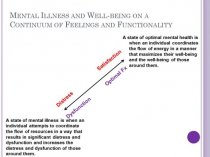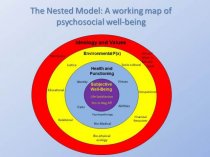 A colleague and friend of mine who is a retired professor of pathophysiology with a longstanding interest in psychiatry and human behavior made a very important point to me in our conversations about mental health. “When I was learning about what constituted a diseased liver, ” he said, “one of the most important pieces of knowledge I had was what a healthy liver looks like to serve as a comparison. Yet, in mental health and psychiatry, basically what you have are descriptors of dysfunction but no real comparison or reference models of what constitutes psychological health. Instead, there is a just a vague claim that the current presentation must not be ‘normal’.”
A colleague and friend of mine who is a retired professor of pathophysiology with a longstanding interest in psychiatry and human behavior made a very important point to me in our conversations about mental health. “When I was learning about what constituted a diseased liver, ” he said, “one of the most important pieces of knowledge I had was what a healthy liver looks like to serve as a comparison. Yet, in mental health and psychiatry, basically what you have are descriptors of dysfunction but no real comparison or reference models of what constitutes psychological health. Instead, there is a just a vague claim that the current presentation must not be ‘normal’.”
This is an excellent point. Although this has changed some in recent years with the emergence of positive psychology, it remains the case that far less attention has been paid to clarifying what constitutes psychological health than psychopathology. And, for far too long psychological health was essentially defined in terms of the absence of psychopathology. In recognizing this point, however, it must also be acknowledge that understanding psychological health is quite tricky and complicated. Consider it this way: It is much more straightforward to answer the question of what is a healthy liver than what is a healthy person. The latter feels (and is) much more value-laden and culturally bound. But that does not mean we are paralyzed and the goal of this blog is to help readers think more explicitly about what it is that constitutes psychological health.
In recognizing this point, however, it must also be acknowledge that understanding psychological health is quite tricky and complicated. Consider it this way: It is much more straightforward to answer the question of what is a healthy liver than what is a healthy person. The latter feels (and is) much more value-laden and culturally bound. But that does not mean we are paralyzed and the goal of this blog is to help readers think more explicitly about what it is that constitutes psychological health.
To begin with, let’s start with the most general definitions and conceptions of mental health. The World Health Organization explicitly defines mental health as “a state of well-being in which [an] individual realizes his or her own potential, can cope with the normal stresses of life, can work productively and fruitfully, and is able to make a contribution to her or his community”.
I believe we can also think about mental health and illness on a continuum that is represented in the depiction below. Here the key is to think about mental health on two related but separable dimensions of subjective experience and functionality. Thus, mental illness is broadly characterized in terms of mental distress and dysfunction, whereas mental health can be thought of in terms of mental satisfaction/happiness and optimal functioning.
Source: www.psychologytoday.com
You might also like:




















